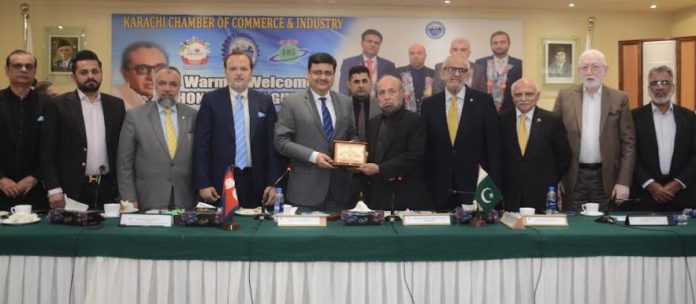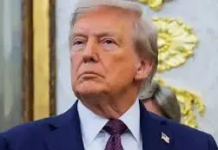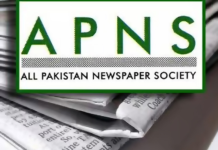KARACHI: /DNA/ – The Ambassador of Nepal Tapas Adhikari has stressed that Nepal and Pakistan were developing countries who have to effectively mobilize tradeable resources and products by directly exchanging them with each other instead of receiving the same indirectly through other routes.
“Nepal and Pakistan have competitive advantage in various agricultural products whose trade needs to be promoted. The business community of Pakistan must look into the possibility of importing Nepalese tea, cardamom, ginger and several other products, which were being exported to Europe, USA and India etc.”, he added while speaking at a meeting during his visit to the Karachi Chamber of Commerce & Industry (KCCI).
Honorary Consul General of Nepal in Karachi Mushtaq K. Chhapra, President KCCI Mohammed Tariq Yousuf, Chairman Diplomatic Missions & Embassies Liaison Subcommittee Ziaul Arfeen, Former President Majyd Aziz and KCCI Managing Committee Members were also present on the occasion.
Nepalese Ambassador noted that Pakistan imports around 800 million kilograms of tea every year mostly from east African countries, of which some portion can also be imported from Nepal which produces good quality tea. “Although we are not in a position to completely cater to Pakistan’s massive demand for tea as Nepal produces around 40 million kilograms of tea per annum but we can certainly contribute to some extent”, he added.
He was of the view that the good relations in political terms and also the goodwill between the people of Nepal and Pakistan have not been translated in the field of economy mainly due to less interactions between the business communities of Nepal and Pakistan who have been neglecting each other. “The existing meager trade volume needs to be doubled through collective efforts. The prime objective should be to start off more interaction between the private sectors of the two countries which would certainly help in expanding the scope of businesses.”
While assuring to disseminate information about Karachi Chamber’s forthcoming My Karachi Exhibition amongst the members of Nepalese business community, Tapas Adhikari also invited the business community of Karachi Chamber to pay a visit Nepal to explore trade, investment and tourism opportunities which will be fully facilitated the Embassy of Nepal. “Any Pakistani businessman looking forward to invest in Nepal will also be fully supported.”
He informed that before COVID-19 pandemic over 2 million foreign tourists visited Nepal, of which less than 5,000 tourists were received from Pakistan which needs to be enhanced by at least 10 times.
Earlier President KCCI Mohammed Tariq Yousuf, while welcoming the Nepalese Ambassador, pointed out that there were major hurdles between Pakistan-Nepal bilateral trade including geographical limitations due to transit routes refusal from India, lack of infrastructure linkages and the Quantum of informal trade between India and Nepal. “Due to Nepal’s reliance on India, the textile products & Other commodities influx from the informal channel affects Nepal in terms of revenue loss and makes it less competitive internationally, besides damaging Pakistan-Nepal bilateral trade.”
He said that Pakistan’s exports to Nepal stood at a meagre of $5.77 million in FY22 while the imports from Nepal stood at $1.54 million in FY22, indicating trade in favor of Pakistan. To improve the existing trade volume, President KCCI suggested to establish Joint information centres at the Commerce Ministries so that the importers and exporters of both countries could be facilitated to boost trade whereas seminars, workshops and exhibitions must also be taking place regularly to improve the communication gap.
He further invited the Nepalese business community to participate in KCCI’s forthcoming “My Karachi Exhibition” at Karachi Expo Center next month which would provide a wonderful platform to explore business and investment opportunities. “The student’s internship program in Pakistan and Nepal in the fields of commerce, business and social Sciences may also be initiated at the University level. The private sector should be encouraged to open educational institutions in Nepal while the Nepalese government should provide necessary facilities for this growing industry.”
Underscoring the need to readjust customs & tariffs to promote trade between Nepal and Pakistan, he opined that this would help cement the existing ties and enable the two countries to promote regional connectivity and achieve economic growth and development. “Pakistan is rich in its tourist destinations offering choices to all types of tourists and so was Nepal, hence, both countries should work together to develop a public-private partnership for promoting intra-country tourism.

















